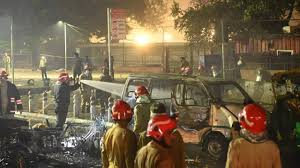
Red Fort Blast: Pakistan's Threat to India Explored
The recent blast near Delhi's Red Fort has sent shockwaves across India, with a Pakistani leader publicly claiming responsibility. Anwarul Haq, a former leader from Pakistan-occupied Kashmir, stated that the attack was carried out in retaliation for India's actions in Balochistan. In a recent viral video, he boasted about the strikes from the Red Fort to the forests of Kashmir, implying a broader agenda of terror against India.
The Delhi blast, which occurred on November 10, tragically claimed the lives of ten individuals and injured many more. Investigators later linked this attack to a “white-collar terror module” associated with Jaish-e-Mohammed (JeM), a notorious extremist group founded by Masood Azhar. This group has a history of conducting violent attacks in India, and the recent incident is a stark reminder of the ongoing tensions between the two nations.
Anwarul Haq's comments reflect a growing narrative within Pakistan that blames India for unrest in Balochistan, a claim that India has consistently denied. The Indian government argues that such allegations are merely a distraction from Pakistan's own history of supporting cross-border terrorism. As tensions rise, both nations are on high alert, with Pakistan's defense minister Khawaja Asif warning of the possibility of an "all-out war."
Asif emphasized the need for Pakistan to remain vigilant against India, stating that the country cannot be trusted. He warned that India has the capability to launch attacks from various fronts, including potential bases in Afghanistan. This rhetoric underscores the volatility of the situation, with both sides gearing up for possible conflict.
The investigation into the Delhi blast revealed that the car used in the attack was driven by a Kashmir-origin doctor, Umar Un Nabi, who had ties to other suspects arrested in Jammu and Kashmir. The discovery of stored explosives and weapons in Faridabad points to a well-organized terror network operating within India. The implications of this incident are far-reaching, as it raises questions about national security and the ongoing threat of terrorism.
In conclusion, the Red Fort blast and the subsequent claims by Pakistani leaders illustrate the deepening tensions between India and Pakistan. With both nations on edge, the potential for escalation remains high, and the international community watches closely as developments unfold.









